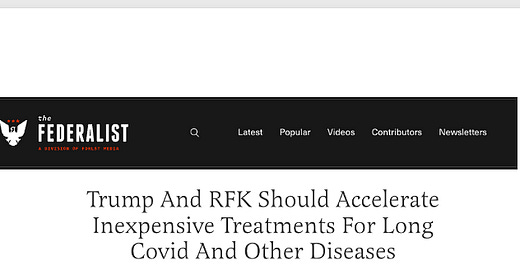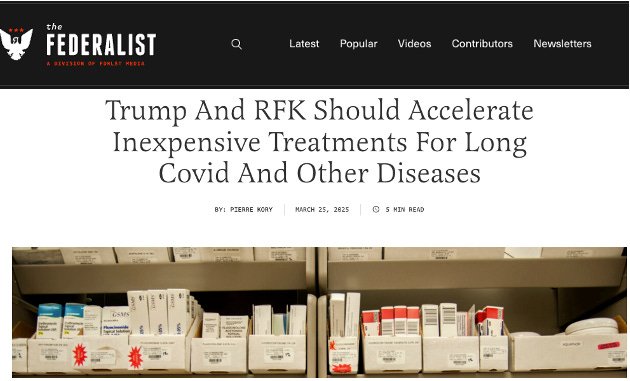We Published A Mainstream Op-Ed Calling For More Research Into Repurposed Drugs
Today's Op-Ed also announces the launch of my new non-profit called Rebuild Medicine. Mission: To get back to "real science” based on honest data to help create a new regulatory framework
Many shortcomings in medicine stem from the system incentivizing costly and proprietary treatments rather than safe ones that actually get patients better. Because of this, the cost of healthcare keeps going up while many remarkable off-patent therapies (e.g., repurposed drugs) that transform the practice of medicine simply languish in obscurity.
Making America Healthy Again (and making healthcare affordable) will require taking a serious look at those forgotten therapies and effectively advocating for their inclusion in the medical standard of care. Rebuild Medicine was created to do just that and I am immensely hopeful we have at last entered a point where we can change this dysfunctional paradigm that prioritizes profits over patients. Please consider supporting their work; they have the right people to make real changes happen. — A Midwestern Doctor (Author of The Forgotten Side of Medicine)
In response to surging healthcare costs, increasing chronic diseases, and declining life expectancy, know that I, along with Doctors Paul Marik, Adam Brufsky, Mahesh Shenai, and Stephen Smith have created a new non-profit organization called Rebuild Medicine, of which I am the Chief Medical Officer and Paul is our Senior Research Advisor.
Having just graduated from the “School of Hard Knocks” with a degree in Covid :), we want to apply the many lessons we learned in Covid to better develop approaches for addressing the growing rates of illness that is not only bankrupting America but also the health of its citizens. We hope our efforts will restore scientific rigor, demand greater transparency, and publicly share new insights to medical care based on both higher and more rational standards of evidence-based medical research.
As many of my readers already know, Rebuild Medicine’s first act has been to fund and conduct an observational study in cancer where we complement standard of care protocols by adding repurposed drugs with anti-tumor mechanisms, many of which can target cancer stem cells, something which current conventional treatments do not. If you or anyone you know is interested in participating in the study or receiving such care, information on the study can be found here and here. Adam Brufsky, MD, PhD, an oncologist and Professor of Medicine at the University of Pittsburgh School of Medicine who serves on the Board of Rebuild Medicine said:
“Cancer is arguably the most promising target for repurposing generic drugs. Unfortunately, conventional medicine often overlooks the opportunity to explore and utilize new applications for existing medications. We established this organization to lead the effort in reversing the alarming trend we are witnessing in medicine – spending more while achieving worse outcomes.”
The approach we have adopted is also being studied by a number of academic medical centers. The insights from such studies will enhance clinical and public knowledge of the potential for accessible and affordable therapies to better limit cancer progression and improve patient survival, either alone or in conjunction with standard chemotherapy.
In addition we also recently began funding a study in South America of a promising and widely available non-prescription medicine that we believe can treat TB! We also plan to explore more research into repurposed drugs to treat the cognitive deficits and other neurologic conditions that we see in our Long Covid and Long Vax patients (as well as research into other diseases). As per our website:
Rebuild Medicine is a 501 (c) (3) nonprofit, nonpartisan coalition focused on putting patients back at the center of public health. We aim to identify the best solutions grounded in scientific rigor, transparency, and open dialogue while broadly sharing evidence-based medical information at the most reasonable cost. This approach will empower individuals to take control of their health, restore credibility to medicine, and strengthen our healthcare system to improve public health.
Basically, we want to get back to real “science,” — not the politicized “follow the science” messaging — allowing for a new regulatory framework for the systematic, transparent study and use of repurposed generic drugs. This effort can complement FDA review, guide clinical practice, and devise new methods for reimbursement to assure Americans benefit. Doing so will mark a major step forward in Secretary Kennedy’s vision for a healthier America.
To wit, we published the following Op-Ed today:
Generic drugs can combat an array of chronic diseases, but only if the Trump administration creates a structured, interdisciplinary study of these drugs.
Five years after Covid, even New York Times columnists are admitting the horrendous public policy mistakes that nearly destroyed the country. While very few are defending what happened, we are all living with the trail of broken promises and the broader and enduring health setbacks. This failure is most evident in the misguided mass vaccination strategy pursued by the Biden administration.
Health and Human Services Secretary Robert F. Kennedy Jr. can seize this opportunity to regain public trust by harnessing the potential of repurposed generic drugs that have been sitting on the sidelines for too long.
Early in the pandemic, top research institutions urgently collaborated to study potential treatments. Physicians around the world published research showing repurposed drugs like hydroxychloroquine and ivermectin treated Covid symptoms and had demonstrable clinical benefit. But the National Institutes of Health (NIH) and other scientific bodies halted trials on the basis of safety concerns that were clearly driven by politics — not science. Proponents of repurposed drugs were shunned, and resources that were committed to studying them were used to push vaccines with no long-term efficacy or safety data.
Biden and his top health officials made numerous false claims about the protection vaccinated people could expect against Covid and illegally attempted to force employers to require vaccines. As a result, after five years. trust in public health has never been lower, and we haven’t learned much about the potential of repurposed drugs to treat Covid. The disease killed about 2,700 people in the past month.
Repurposed drugs alone or in combination can combat an array of chronic diseases, but only if the Trump administration reverses the policies of its predecessor and creates a structured, interdisciplinary study of repurposed generic drugs. Working hand in hand, government agencies, together with independent, practicing physicians, scientists, clinicians, and other health experts, can build a transparent and accountable system to study and discover cost-effective new ways to improve health.
About 17 million adults have Long Covid, which is defined as symptoms that last for three months. The CDC website correctly labels Long Covid a “serious public health concern.” Yet, in the same breath, they also refer to the Covid vaccine as the “best available tool.” On that point, the government could not be more wrong. In fact, Long Covid more often starts after vaccination than it does the illness.
Over the past three years, my practice has evaluated and treated more than 1,500 patients suffering Long Covid symptoms. Most reported their symptoms starting not after a Covid infection, but after vaccination. Two generic drugs that we have found that improve symptoms are ivermectin — a Nobel-prize winning wonder treatment that FDA mocked during the pandemic — and low-dose naltrexone.
Other treatments show promise and merit further study. Elon Musk’s critics weaponize his use of ketamine to discredit his decision-making, but at low doses the drug’s ability to regrow nerves and synapses, remyelinate nerves, and inhibit neuroinflammation has led to growing use in psychiatry to more effectively treat anxiety, depression, and bipolar disorder. Through my network of practicing clinicians, I have learned that many experienced psychiatrists using low-dose ketamine have also observed improvements in co-morbid neurological conditions such as peripheral neuropathy, dementia, and ALS. A Mount Sinai study found it could even help treat a rare form of autism in children.
Then there is dimethyl sulfoxide (DMSO) — an FDA-approved treatment for bladder pain syndrome. Dozens of in-vitro studies show DMSO’s potential for treating cancer in humans and animals. Several clinical trials found that long-term administration of DMSO significantly increased survival in colon cancer and gastric cancer, and even led to remission in some patients. In 2022, President Biden re-launched his Cancer Moonshot with the laudable goal of cutting the cancer death rate by at least half by 2047, but he missed an opportunity to study new applications for old drugs.
To read the rest of the Op-Ed, I encourage you to read it at the Federalist website here.
Pierre Kory is Chief Medical Officer of the non-profit Rebuild Medicine and Co-Founder of The Leading Edge Clinic.
To help support our efforts at Rebuild Medicine, please “join” at the bottom of this page and if you are so inclined as to donate, we will be sending out a secure link to our members in order to do so (current glitch with our donate button).
P.S. If you appreciate the effort and time I spend researching and writing my posts and Op-Ed’s, support in the form of paid subscriptions is greatly valued. You also DO NOT want to miss out on my next posts on chlorine dioxide, I promise.



